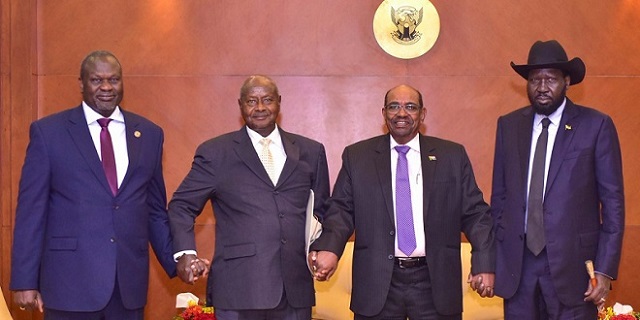
After September peace deal, new report reveals likely hotspots for war
Kampala, Uganda | RONALD MUSOKE | On Oct.31, happiness and joy filled the South Sudanese capital, Juba, when several high profile leaders in eastern Africa joined President Salva Kiir and his former deputy, Dr. Riek Machar, to celebrate the “return of peace to South Sudan.”
News of Machar’s return to Juba for the first time in two years added to the excitement. Almost two months earlier, on Sept. 12, the two former allies-now-turned foes had appended their signatures to a peace agreement made possible by a painstaking mediation led by the regional body the Intergovernmental Authority on Development (IGAD).
Uganda’s President Yoweri Museveni, Omar Hassan al-Bashir of Sudan, Somalia’s Mohamed Abdullahi Farmajo Mohamed, Eritrea’s Isaias Afwerki, Ethiopian President Sahle-Worke Zewde and Egyptian Prime Minister; Mostafa Madbouly, were also in Juba for the celebrations.
The peace agreement signed under the theme: “Celebrating the dawn of peace, appreciating friends, cherishing reconciliation and unity” signaled the latest effort to end a civil war which erupted in 2013, just two years after the newest independent state on the continent seceding from Khartoum.
Before the outbreak of violence, Kiir and Machar squabbled over what observers of the conflict referred to as unequal distribution of power in the government with Machar reportedly feeling shut out from power in his role as South Sudan’s vice president.
At one point Kiir accused Machar of masterminding an attempted coup d’état. When Kiir eventually sacked him in 2013, Machar took up arms against Kiir later that year.
Museveni preaches peace
In his address to thousands of South Sudanese gathered around Dr. John Garang’s Mausoleum in the capital, Museveni; who is one of the guarantors of the peace, cautioned the South Sudanese leaders against the dangers of dividing people along sectarian lines; including tribalism and religion, and forgetting development and economic transformation.
“Am sure this is the end of conflict in South Sudan,” Museveni said. He described how war is wasteful and advised that political arguments can be solved by discussions or free and fair elections. Meanwhile President Kiir congratulated Machar and other opposition leaders for agreeing to come and celebrate peace. Kiir said their presence is strong testimony for peace in South Sudan. “The war era has ended, peace and prosperity has come,” he said. Then he apologized for being part of the war that has raged on for five years. He said it was “a total betrayal against the people of South Sudan.”
Museveni’s responsibility
Ateny Wek, the spokesperson of the government of South Sudan called the agreement “the final, final” deal to emphasize a determination not to return to war. But it was not lost on anyone that this is the 12th such peace agreement for South Sudan since 2013.
So even with the excitement on the streets of Juba; many observers say it is hard to believe that the current peace deal will prevent the country from sliding back into civil war.
It might take months or even years, but war will erupt unless the mode of policking in South Sudan changes fundamentally. “With the signing of the revitalized agreement, we should publicly acknowledge it is one step on the road to peace, but one which lays the foundation for all that follows,” David Shearer, the head of the UN mission in South Sudan told The Associated Press, moments after the signing of the treaty.
The International Refugee Rights Initiative (IRRI) has even produced a report on South Sudan titled “We do not honour agreements.” Thijs Van Laer, the programme director for Prevention and Resolution of Exile at the IRRI and author of the report told The Independent on Nov. 09 that Museveni should this time use his influence over the South Sudanese elite, including President Kiir, to make sure that they stop their military offensives and commit to meaningful reform.
“Museveni and his regional colleagues have the responsibility to see this agreement through,” he said. He said provisions on monitoring the agreement have not improved compared to the previous agreement, and there are still no built-in sanctioning mechanisms for spoilers. He told The Independent that fighting is still ongoing in different parts of the country, by signatories as well as by those who refused to sign the agreement.
“While steps are being taken to prepare the implementation of the power-sharing parts of the agreement, which was the main focus of the discussion in the talks, I’ve seen little commitment to other parts of the agreement, such as on accountability, government reform or the reform of the security sector.”
 The Independent Uganda: You get the Truth we Pay the Price
The Independent Uganda: You get the Truth we Pay the Price



